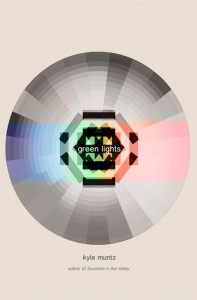 Green Lights
Green Lights
by Kyle Muntz
Civil Coping Mechanisms, May 2014
108 pages / $13.95 Buy from Amazon
In Kyle Muntz’s Green Lights, we’re exposed to wavelengths as beams of prose, an unnamed narrator whose world is flooded in the disparate hues of existence. There’s a meditative quality throughout, a detachment borne of Kafkaesque inquiry and a yearning for communication that teeters on the fiat lux’s of every day creation. Not just through visible light, but the invisible nanometers that escape normal sight. “I want to talk about color,” the book begins, and the colors of the spectrum quickly become a metaphor for revelation and metamorphosis. The characters, from the moon turned into a woman, to an old man embodying evil, become symbolic accoutrements for the journey which turns out to be an excursion to another dimension. Elements of the fantastic shine as in the “Blue” chapter when the whole neighborhood is covered in noirish film shades that masquerade as night, and then, “The world froze… Ice had taken over the world.” Winter isn’t just the congealing of the veins and muscles, but a coat of futility wrapped around his routine actions. “After much effort, I thawed my room. I’m not proud of the things I did to accomplish this,” he confesses, then further reveals, “I got a job carrying a flamethrower around the neighborhood, melting people. My coworkers treated me like shit.” The frost of survival is just as bleak as the cold treatment of his colleagues and the blending of colors weaves the conflagration of pain with the inferno of transformation.
There’s a melodic beat to Muntz’s writing, terse descriptions of events interspersed with sudden bursts of graphic visuals, often macabre in its evocations. It’s a delicate balance, but one he masterfully navigates, exploiting minimalism to maximize emotional defibrillations, injecting the grotesque to animate the mundane:
“One time when I was walking in the darkness, I stumbled over something, and it was him, sprawled on the ground, unable to move. He didn’t have eyes anymore. Maggots crawled amidst the remnants of his skin, fibrous muscles like totted spaghetti. Worms fucked his intestines. Beetles were chewing his brains.”
Like signal lights, there’s a revolving flow of ideas that are given free rein and then brought to a halting stop, warning yellows demarcating the blurry boundaries between illusion and reality. That border is often where Muntz’s narrator lingers, rarely surprised by the absurdity of the surreal events that happen around him, instead, levitating past the barriers. It’s almost as though the green light were always on and physics broken free of limitations to innovate. Muntz revels in experimentation, relishes the opportunities to change up the traditional narrative as he bakes x-rays of playful contemplations into the atlas of his construction:
“Sometimes when I looked into the distance, I remembered that the darkness I could see there was actually the mountain, holding up the base of the universe. If I were to walk that way, the neighborhood would never end, but eventually it would become less real… The road continued even where the world began to change colors.”
His main companion is his love interest, E, who is as curious as the narrator about the frontier, a geography that challenges the intellectual as much as the physical. Both are intertwined and both affect each other, a symbiotic terraforming that is volcanic in its effect.
“Nearby, behind an abandoned house, we found an immense flower growing from the ground. The flower was at least a hundred feet tall. Beads of water clung to its sides… She nodded. ‘It looks like a picture of itself, meaning it looks better than real. That means something. It implies amazingness.’
‘Should we climb it?’
‘Probably,’ she said. ‘If we didn’t, we would feel bad about it later.’”
There’s a lot of climbing in Green Lights and like E, we know we’d feel bad if we didn’t venture upward. Along the way, we get dashes of the videogame classic, Earthbound, embedded with David Lynch, Borges, and doses of Marquez. The combination acts as a variety of hues to assault our senses in this quirky and likable hike while at the same time, Muntz weaves his own identity through the narrative. I just wish there were more colors in the spectrum.
***
Peter Tieryas Liu is the author of Bald New World and Watering Heaven. He entropies at entropymag.org. He loves green lights. And red ones. And blue ones too.
Tags: civil coping mechanisms, Green Lights, kyle muntz, Peter Tieryas Liu
